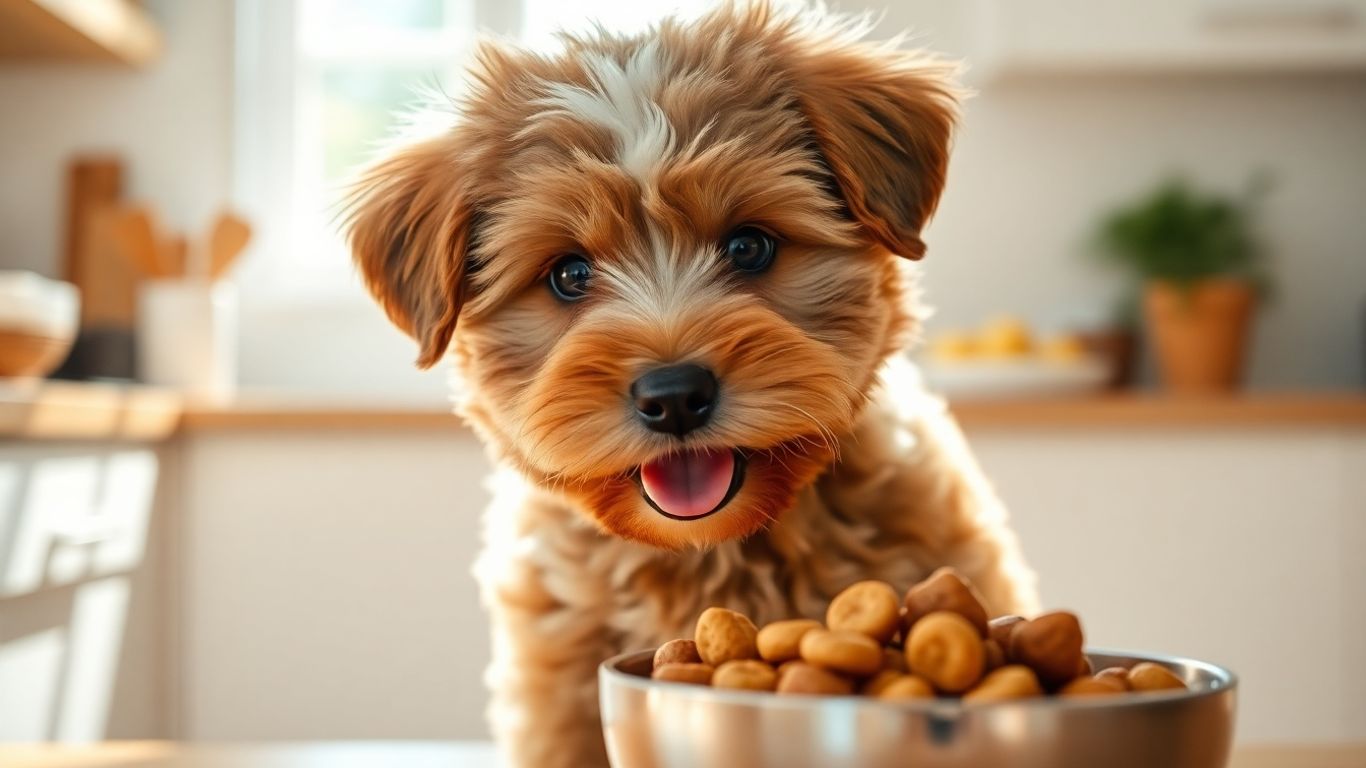Doodle puppies, a delightful mix of breeds, come with their own set of dietary needs. These unique requirements stem from their parentage, often a Poodle crossed with another breed like a Golden Retriever or Bernese Mountain Dog. This blend means they can inherit traits from both sides, influencing everything from their coat type to their energy levels and potential sensitivities. Understanding these specific nutritional demands is the first step to raising a healthy, happy Doodle.
Unique Needs Stemming From Parent Breeds
Doodles often have a Poodle parent, known for intelligence and sometimes a sensitive stomach. The other parent breed contributes its own characteristics. For instance, a Goldendoodle might inherit the active nature of a Golden Retriever, requiring more calories, while a Bernedoodle might need attention paid to joint health due to the Bernese Mountain Dog’s predisposition. Recognizing these inherited traits helps tailor their diet. For example, some Doodles may benefit from diets formulated to support skin health, a common concern with certain coat types.
The Role of Nutrition in Cognitive Function
Beyond physical health, nutrition plays a big part in how well a Doodle puppy’s brain develops. A well-balanced diet, rich in specific nutrients like Omega-3 fatty acids, supports cognitive sharpness. This is particularly important for training, as a puppy with a well-nourished brain will be more attentive and responsive. Think of it as fueling their learning process. A diet that supports brain health can make a noticeable difference in their ability to pick up new commands and adapt to new situations.
Tailoring Diets for Coat Health and Energy
Two standout features of Doodles are their coats and their energy. Many owners choose Doodles for their potentially hypoallergenic coats, and proper nutrition is key to keeping that coat healthy and lustrous. Ingredients like Omega fatty acids are vital here. Similarly, their often-high energy levels mean they need a diet that provides sustained energy without causing a crash. This means focusing on quality protein and complex carbohydrates rather than simple sugars or fillers. Meeting these specific needs ensures your Doodle puppy thrives.
Essential Nutrients for Growing Doodle Puppies
Growing Doodle puppies have specific dietary needs to support their rapid development. Providing the right nutrients is key for everything from strong bones to a shiny coat. It’s about giving them the building blocks they need to thrive.
Prioritizing High-Quality Protein Sources
Protein is the foundation for muscle growth and overall development in puppies. Look for foods where a named meat source, like chicken, lamb, or fish, is the first ingredient. This ensures your puppy is getting easily digestible protein, which is vital for their energy and repair processes. Avoid generic meat by-products; real meat is best for your growing Doodle.
Complex Carbohydrates for Sustained Energy
Puppies need energy to explore and learn, and complex carbohydrates provide this in a steady way. Ingredients like sweet potatoes, brown rice, and oats offer sustained energy release, unlike simple sugars that can lead to energy spikes and crashes. These also contribute fiber, which aids digestion. A balanced carbohydrate source is important for your Doodle’s active lifestyle.
Omega Fatty Acids for Skin and Brain Health
Omega-3 and Omega-6 fatty acids are superstars for your Doodle’s health. They play a big role in keeping their skin healthy and their coat looking great. Plus, these essential fatty acids are important for brain development and cognitive function. Sources like fish oil and flaxseed are great additions to a puppy’s diet.
Vitamins, Minerals, and Digestive Support
Beyond the main macronutrients, a range of vitamins and minerals are needed for every bodily function. Calcium and phosphorus are critical for bone development, especially in larger Doodle breeds. Digestive support, through prebiotics and probiotics, can also make a big difference, particularly if your Doodle has a sensitive stomach. A well-rounded diet supports overall well-being.
Proper nutrition during puppyhood sets the stage for a lifetime of good health. It’s not just about filling their bowl; it’s about providing the precise nutrients they need at this critical growth stage.
Choosing the Right Food for Your Doodle Puppy
Selecting the right food for your growing Doodle puppy is a big decision. It impacts their energy, coat, and overall health. With so many options out there, it can feel overwhelming, but breaking it down makes it manageable. The goal is to find a diet that supports their unique needs as a hybrid breed.
There’s no single ‘best’ food for all Doodles. Each dog is an individual, and what works for one might not suit another. However, focusing on quality ingredients and understanding your puppy’s specific requirements is key. This guide helps you sort through the choices to pick a food that sets your Doodle up for a healthy life.
Remember, the food you choose is a direct investment in your puppy’s well-being. It influences everything from their shiny coat to their ability to learn and play. Making an informed choice now will pay off in the long run for your furry friend.
Managing Your Doodle Puppy’s Diet

Determining Appropriate Portion Sizes
Getting the portion sizes right for your growing Doodle puppy is key. It’s not just about filling the bowl; it’s about providing the correct amount of fuel for their rapid development. Overfeeding can lead to unhealthy weight gain, putting stress on developing joints, while underfeeding can stunt growth and leave them lacking energy. Always start with the feeding guidelines on your chosen puppy food packaging, but remember these are just starting points. Your puppy’s individual metabolism and breed mix will influence their exact needs. Using a measuring cup for every meal is non-negotiable. This simple step prevents guesswork and ensures consistency, which is vital for managing your Doodle puppy’s diet effectively.
Strategies for Weight Management
Weight management for Doodle puppies is an ongoing process. Doodles, especially those with Poodle heritage, can be prone to weight gain if their diet isn’t carefully monitored. Treats, while great for training, can add up quickly. Aim to keep treats to no more than 10% of their total daily caloric intake. If you’re feeding table scraps, stop immediately – these are often high in calories and can contain ingredients harmful to dogs. Regularly assess your puppy’s body condition. You should be able to feel their ribs easily under a thin layer of fat, but they shouldn’t be visibly protruding. Adjusting food portions based on their activity level and growth rate is a smart strategy for weight management.
Understanding Calorie Needs Based on Activity
Your Doodle puppy’s calorie needs aren’t static; they change based on their activity level, age, and even the weather. A puppy who spends hours playing fetch will require more calories than one who has a more sedentary day. As they grow, their metabolism shifts, and their calorie requirements will adjust accordingly. During colder months, when outdoor play might be reduced, you may need to slightly decrease their food intake to prevent weight gain. Conversely, during growth spurts or periods of intense training, their calorie needs might increase. Paying close attention to your puppy’s energy levels and body condition is the best way to understand their current calorie needs. Regularly monitoring your Doodle puppy’s diet helps ensure they are getting the right amount of energy for their lifestyle.
Consistent feeding schedules and accurate portion control are the cornerstones of a healthy diet for any growing puppy, especially active breeds like Doodles.
Here’s a general guideline for portion sizes, but always consult your vet:
Age (Months)
Daily Food Amount (Cups)
2-3
1.5 – 2.5
4-5
2.5 – 3.5
6-8
3.5 – 4.5
9-12
4.0 – 5.0
Note: These are estimates. Adjust based on your puppy’s specific food and veterinarian’s recommendations.
Identifying and Addressing Food Sensitivities

Doodles can sometimes be a bit picky or sensitive when it comes to what they eat. It’s not uncommon for them to react to certain ingredients, leading to issues like itchy skin or tummy troubles. Figuring out what’s causing these problems is key to keeping your pup happy and healthy.
Paying attention to your Doodle’s reactions is the first step in managing food sensitivities. If you notice persistent itching, ear infections, or digestive upset, it might be time to look closely at their food. These signs often point to an intolerance or allergy to something in their current diet. It’s a process of observation and adjustment to find what works best.
Understanding these sensitivities helps in making informed choices about their food. It’s about finding a balance that supports their unique needs and prevents discomfort. This careful monitoring can make a big difference in their overall well-being.
Monitoring Your Doodle Puppy’s Health Through Diet
Observing your Doodle puppy’s health through their diet is a smart way to catch potential issues early. What goes into their bowl directly impacts their energy, coat, and overall well-being. Paying attention to these signs helps ensure they’re getting the right nutrition.
A healthy Doodle puppy will show it through their physical condition and behavior. This means a shiny coat, clear eyes, good energy levels, and consistent digestion. Their weight should be stable, neither too high nor too low, and they should have good muscle tone. Dental health is also a good indicator; a proper diet can help reduce tartar buildup.
It’s important to remember that diet is just one piece of the puzzle. Regular exercise, grooming, and mental stimulation are also key. However, if the food isn’t right, even the best training or playtime won’t make up for it. Monitoring your Doodle’s health through their diet is a proactive step in their care.
Putting It All Together for a Healthy Doodle
So, feeding your Doodle right is a big deal. It’s not just about filling their bowl; it’s about giving them the building blocks for a long, happy life. Paying attention to what goes into their food, whether it’s premium kibble, home-cooked meals, or a mix, really does make a difference in their energy, their coat, and even how well they behave. Remember to talk to your vet if you’re unsure about anything, especially if your pup has specific health needs. A well-fed Doodle is a happy Doodle, and that’s what we all want, right?